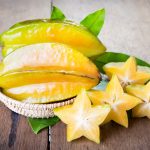Fruit DANGER: Why starfruit could be unhealthy for you
 (NaturalHealth365) Stroll through your local supermarket’s produce section, and you’ll likely spot starfruit, also known as carambola. This tropical fruit is native to Southeast Asia and has a distinctive shape and flavor. It is typically yellow when ripe and has a unique star-like cross-section when sliced, hence its name.
(NaturalHealth365) Stroll through your local supermarket’s produce section, and you’ll likely spot starfruit, also known as carambola. This tropical fruit is native to Southeast Asia and has a distinctive shape and flavor. It is typically yellow when ripe and has a unique star-like cross-section when sliced, hence its name.
Starfruit looks intriguing and tastes good, yet shockingly, most people are unaware of its threat to human health. The fruit contains a toxin that harms the kidneys and other internal organs, including the brain.
The dark side of starfruit: Exposing a deadly neurotoxin
Starfruit looks harmless and delicious, yet the dark truth will steer you away from this tasty delight and lead you toward alternative options. The fruit has a potent neurotoxin that can build up in the blood, move across the blood-brain barrier, and eventually lead to brain and kidney damage.
Starfruit’s caramboxin is a neurotoxin that can inflict irreversible brain damage. Though it appears that one would have to ingest a considerable amount of the fruit for such damage to occur, it is within the realm of possibility. Furthermore, the study linked above proves that the fruit has the potential to compromise other vitally critical internal organs.
The study discusses a tragic case involving a 74-year-old woman with a history of chronic kidney disease and diabetes mellitus. She developed severe complications after eating two whole starfruits and ended up in the emergency room with uncontrollable hiccups. Despite receiving multiple rounds of hemodialysis, her condition worsened rapidly, and she passed away during her hospital stay.
As time progresses, more medical professionals, including those who work in emergency rooms, are connecting the dots between intractable hiccups and other internal problems with starfruit consumption. Starfruit neurotoxicity typically begins with hiccups, progresses to nausea, including physical weakness and vomiting, and quickly worsens to the point that the kidneys stop functioning.
Discover a Simple and Effective Way to Remove Toxins: This is Jonathan's #1 choice for at-home detoxification. Special offer ends Feb. 16.
Starfruit is nephrotoxic, meaning it is toxic to the kidneys. Consuming a considerable amount of the fruit will likely cause oxalate nephropathy, which is kidney damage. Though most people are unlikely to eat more than one starfruit in a single sitting, consuming three or more such fruits can spur nephrotoxicity.
Caramboxin is primarily excreted through the kidneys. Consequently, consuming starfruit can be particularly harmful to individuals with renal insufficiency or compromised kidney function. Those with kidney problems should be aware that consuming merely one starfruit can lead to seizures in as little as a couple of hours. Seizures from starfruit consumption can lead to a coma and eventual death in less than half a week.
Moreover, starfruit juice is especially potent and risky. Less than one cup of the fruit’s juice can prompt nephrotoxicity. The fruit is that much more toxic when consumed while dehydrated or when the stomach is empty.
Healthy and palate-pleasing alternatives to starfruit
Are you looking for tasty and safe alternatives to starfruit? There are plenty of options to choose from! Kiwifruit offers a similar tropical vibe with its sweet-tart flavor and vibrant green flesh. If you’re craving something juicy and sweet, mangoes are a fantastic choice, packed with vitamins and minerals.
Pineapple is another refreshing option, bursting with tangy-sweet goodness. And let’s not forget about papaya, with its creamy texture and subtly sweet taste. These fruits taste amazing and come with a host of health benefits, making them perfect substitutes for starfruit.
So, if you want to enjoy fruit without worrying about potential risks, these alternatives have got you covered.
Sources for this article include:



